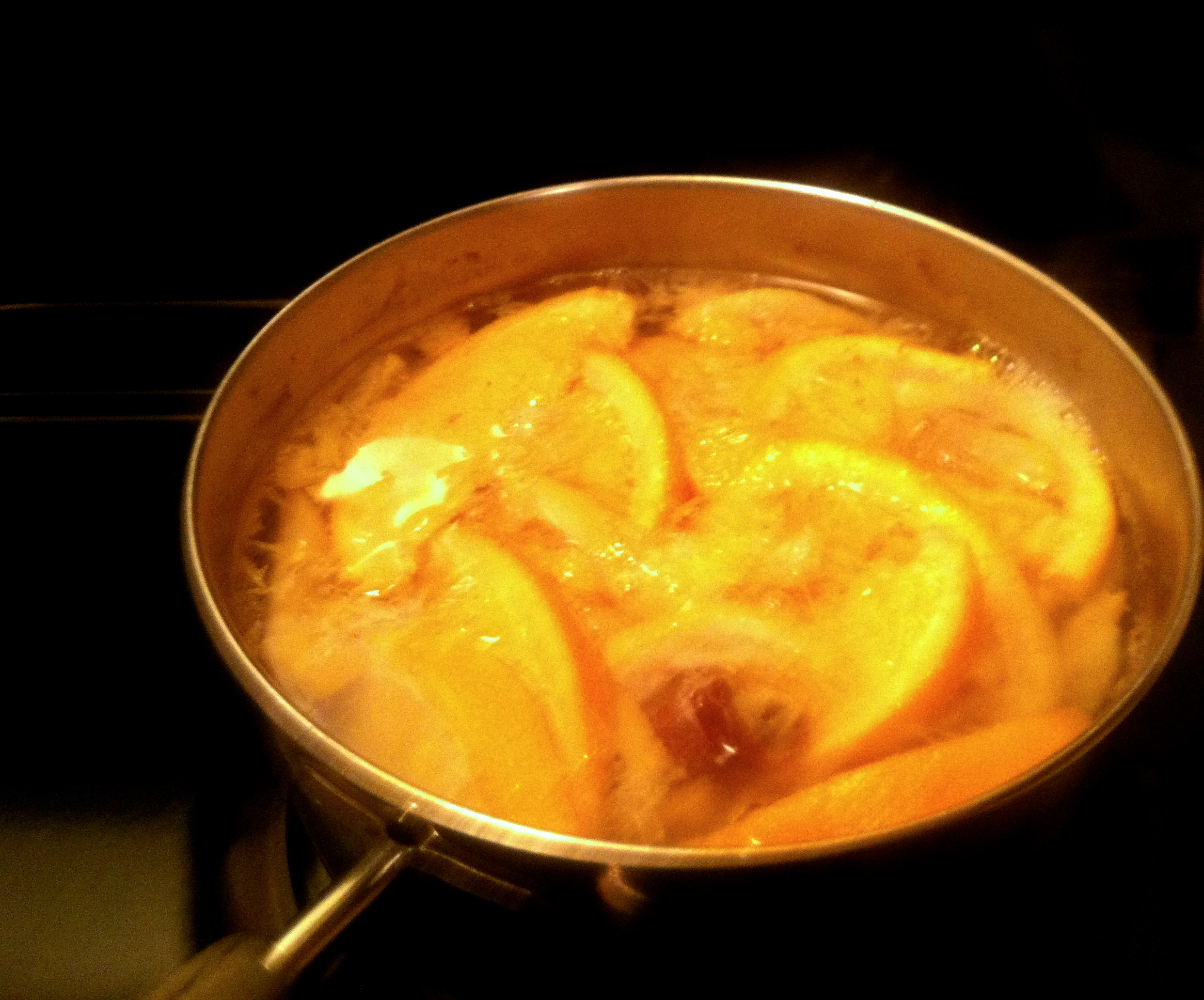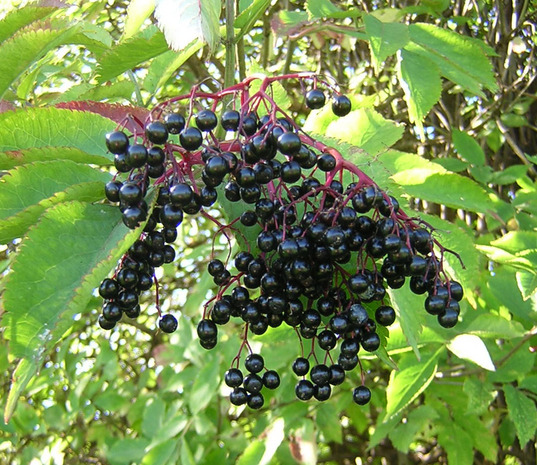 When I came down with the fierce and lingering cold seemingly plaguing the nation, I decided I wasn’t going to give into the consuming bog of mucus nor the chest-rattling cough. Despite the fact that so many of my friends and their families were also being felled by colds and the flu, I had a couple of holistic weapons up my sleeve—in addition to plenty of the tissues.
When I came down with the fierce and lingering cold seemingly plaguing the nation, I decided I wasn’t going to give into the consuming bog of mucus nor the chest-rattling cough. Despite the fact that so many of my friends and their families were also being felled by colds and the flu, I had a couple of holistic weapons up my sleeve—in addition to plenty of the tissues.
First up, I wound up making endless amounts of citrus tea. I sliced up lemons and oranges—2 lemons for every orange. Lemons and oranges are excellent sources of vitamin C, one of the most important antioxidants. Adding fruits (and veggies) rich in phytonutrients and antioxidants into your diet will promote immunity and help your body’s ability to fight infection. Limonoids, compounds found in citrus fruits, also exhibit anti-viral, as well as antibacterial properties.
I made sure to leave on the rind with my citrus fruit slices. The peel contains even higher amounts of phytonutrients and citric acid than the juice. Plan to buy certified organic or naturally grown lemons to remove the risk of pesticide-laden peels.
I have also occasionally added pineapples. Not only is the fruit rich in vitamins A and C, it also contains bromelain. Studies suggest that bromelain might help suppress coughs and loosen mucus.
I add about a tablespoon of freshly grated ginger to the pot. Ginger is not only a great anti-inflammatory, it is also has great antioxidant effects. Ginger also has a nice, warming effect on the body, which can help promote healthy sweating. German researchers found that sweat contains dermicidin, a powerful germ-fighting protein and compound. Ginger also is soothing on the stomach, which is why women use it to reduce nausea and vomiting in pregnancy.
 The tea is incomplete without a cinnamon stick or two. Cinnamon too acts to halt harmful bacteria and fungi. The powerful spice loosens mucus, encouraging more productive coughs. The essential oils in cinnamon stimulate the production of saliva and gastric juices to promote digestion.
The tea is incomplete without a cinnamon stick or two. Cinnamon too acts to halt harmful bacteria and fungi. The powerful spice loosens mucus, encouraging more productive coughs. The essential oils in cinnamon stimulate the production of saliva and gastric juices to promote digestion.
The last optional ingredient for the citrus tea is cayenne pepper—use caution with your dosage here; this stuff has quite a kick. Known for its “spicy” heat, cayenne contains the pain-reliever capsaicin, which also helps to break up and clear congested mucus from the nose and lungs. Cayenne pepper also has a good source of “anti-infection vitamin,” vitamin A. This vitamin is also required for healthy epithelial tissues including the mucus membranes lining the lungs, nasal passages and intestinal tract.
The heat of cayenne pepper is also a natural stimulant for the circulatory and digestive systems, and it also promotes sweating, helping to detoxify the body. Cayenne also promotes healthy digesting by creating hydrochloric acid in the stomach, as well as aid peristalsis, or the involuntary muscular movement of food through the digestive tract, and increase nutrient absorption. With 70 percent of your immune system residing in your gut, it makes sense for you to keep your digestive system healthy and functioning at its best.
After bringing this combination to a boil, cover the pot and let simmer for 8-10 minutes. After pouring a serving into a mug, add 1 tablespoon of raw, local honey. Honey is a rich in probiotics that help promote healthy digestion as well. Honey has long been reported to have antibacterial properties, and it is rich in vitamins, including antioxidant powerhouse, vitamin C. Raw honey can coat the throat to reduce raw, irritated throats. Honey may also promote restorative sleep. Sleep is one of the most important things you can do for your body to help rebound and heal faster.
Acupuncturist Juliette Aiyana, owner of Aiyana Acupuncture and Chinese Herbs, in New York City, makes her own tea. In it, she adds three ½-inch pieces of fresh ginger to a pot containing 3 cups of filtered water and the juice from 1/2 of a lemon. Sometimes adds raw garlic to her ginger tea. “Raw or cooked garlic will keep away the vampires and slay viruses,” Aiyana said in an interview.
Whole garlic cloves contain the compounds, alliin and allinase, that form allicin when cloves are chopped, crushed or bruised. According to Michael Castleman, author of “The New Healing Herbs,” allicin is thought to have antiviral properties, especially destroying the virus cells that cause the common cold and flu.
Aiyana also recommends arming yourself with black elderberry syrup or extract. Black elderberry has been shown in numerous double-blind placebo studies to shut down the flu. In his book Super Immunity, Dr. Joel Fuhrman says studies found elderberry juice can slow the growth of the flu virus, shortening the duration of symptoms, while enhancing antibody levels against the virus. He recommends 2-3 tablespoons daily for adults and 1-4 teaspoons for children, dependent on their age.
“ Just yesterday my patient stopped in complaining about an ongoing cold, stuffed up nose and sore throat,” Ayana said. She gave her patient Gaia brand Black elderberry extract and instructed her to take 3 capsules 3 times daily. “Today she stopped in to tell me that she felt 100 percent better and brought a friend who was under the weather to purchase a bottle. And I noticed that her face was no longer swollen by sinus congestion.”
In addition to extra sleep and more fluids (specifically water), Dr. Rosanne Demanski, naturopathic physician from West Hartford, recommends cutting back on sugar to strengthen your immune system during the flu season. Dr. Suneil Jain, a naturopath, agrees, telling Steve Nash, for Men’s Journal, that a teaspoon of refined sugar suppresses our white blood cells for up to six hours, making it a lot easier to catch infections.
During flu season, it’s also recommended that you have adequate levels of vitamin D. Vitamin D is crucial to activating the body’s immune defenses to react to and fight off serious infection. Sufficient intake of the vitamin triggers the immune system’s T cells into action, effectively detecting and killing invading bacteria and viruses, scientists at the University of Copenhagen discovered in 2010.
Most vitamin D is created as a natural byproduct of the skin’s exposure to sunlight, which naturally decreases in this part of the world during winter. Very few foods in nature contain vitamin D, but they include cod liver oil and the flesh of fatty fish, like swordfish and salmon. With limited sunlight during the winter, Dr. Frank Lipman suggests keeping vitamin D blood levels between 50 and 80ng/ml. In Super Immunity, Fuhrman cites a 2006 study where children experienced reduced incidence of viral respiratory infections in winter when exposed to the influenza virus while given vitamin D.

[…] Vitamin D plays a critical role in activating the body’s immune defenses to react to and fight off serious infection. Sufficient intake of the vitamin triggers the immune system’s T cells into action, effectively detecting and killing invading bacteria and viruses, scientists at the University of Copenhagen discovered in 2010. This is why many medical professionals recommend that people ensure their vitamin D levels are within healthy range during winter to help combat the flu and colds naturally. […]